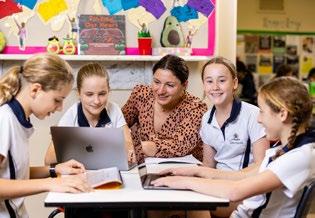
1 minute read
CONNECTIONS AND BELONGING
Building the levels of resilience in children and young people provides them with the ability to reflect upon past adversities and understand they have the capabilities that will let them bounce back from adversity in the future.
An important component of being a resilient person is having connections with family, friends and school which provides children and young people with a sense of belonging and enables them to build trusting relationships. It is important for children and young people to have multiple circles of connection and in practical terms, this means that they build connections at School through the various activities they participate in, their own year group and also with groups they associate with outside of school, such as sporting clubs, musical groups, ballet or performing arts. Our young people should be encouraged to have a broad circle of friends and acquaintances who provide them with opportunities to foster their personal interests, offer different perspectives and opinions and enable them to gain support when there might be a conflict with another group.
Empathy is one important component when making connections with people. When a child or young person can feel what a situation may be like from the perspective of another person, they will learn to be less judgmental and more understanding. Demonstrating empathy is part of character building. Through our wellbeing programs, and underscored by our ethos of ‘Care, Share and Respect’, we encourage junior students to show kindness and understanding towards their peers.
The role of teacher relationships in creating wellbeing
The relationships that students develop with their teachers has a positive influence on how young people feel about school. When students perceive their teachers as creating a caring and well-structured learning environment, they feel valued and respected as individuals.
An OECD report on social and emotional skills highlights that students’ sense of fitting in at school and student-teacher relationships are consistently and positively related to social and emotional skills. Students who feel like they belong at school are more likely to get along well and work well with their classmates and friends.


The value of friendships
Children and young people learn many skills as they make and maintain friendships, including talking about what each need from the friendship, being flexible, sharing honest feelings and giving each other both time and space within the friendship. Children learn to care about the feelings of another person when they are friends. While it is important to stand by a friend when they are facing challenges or there may be a period of conflict within their relationship, there is also a reciprocity within the friendship, rather than one individual who gives more than the other. Both young people need to be committed to being a friend to each other.




